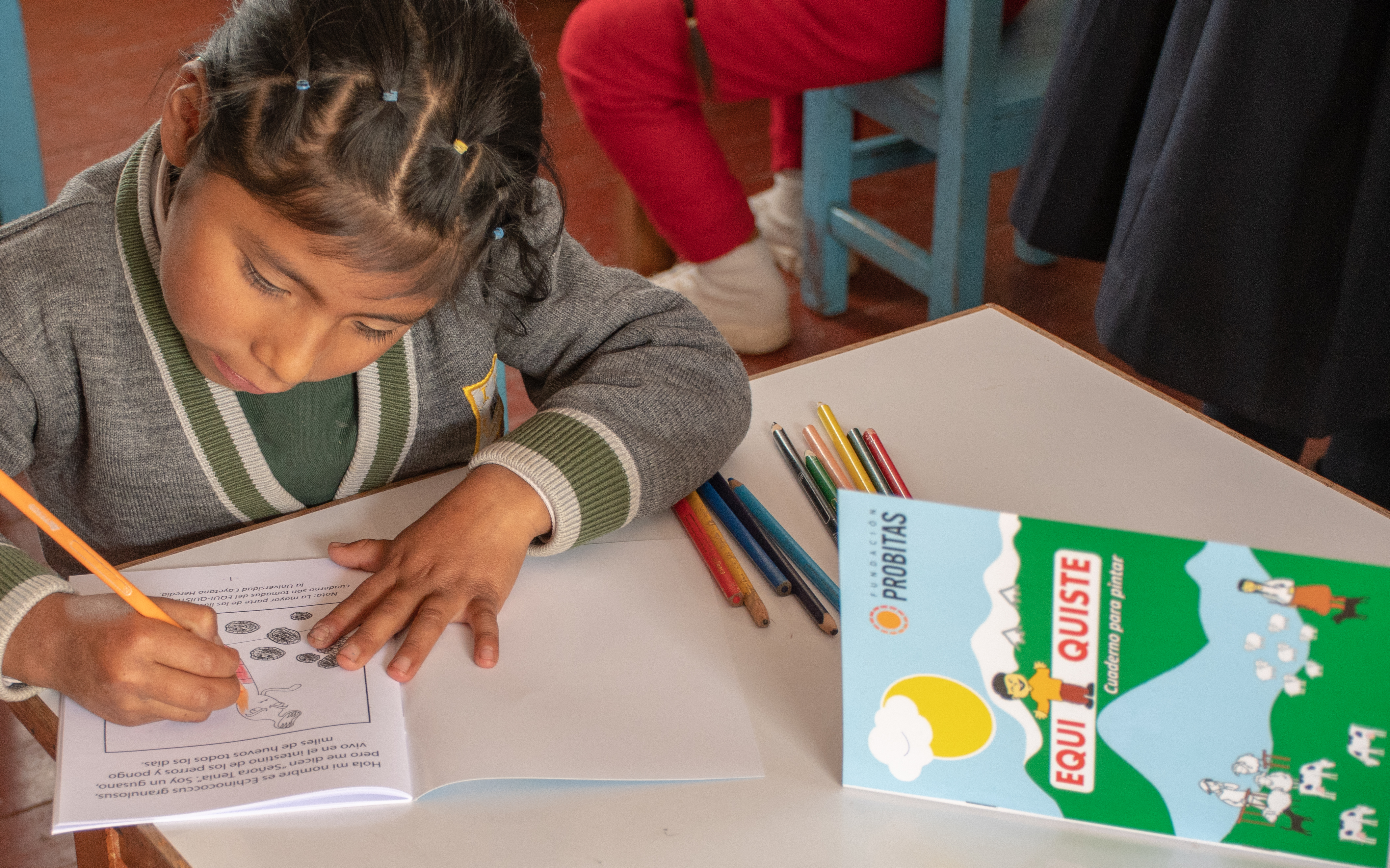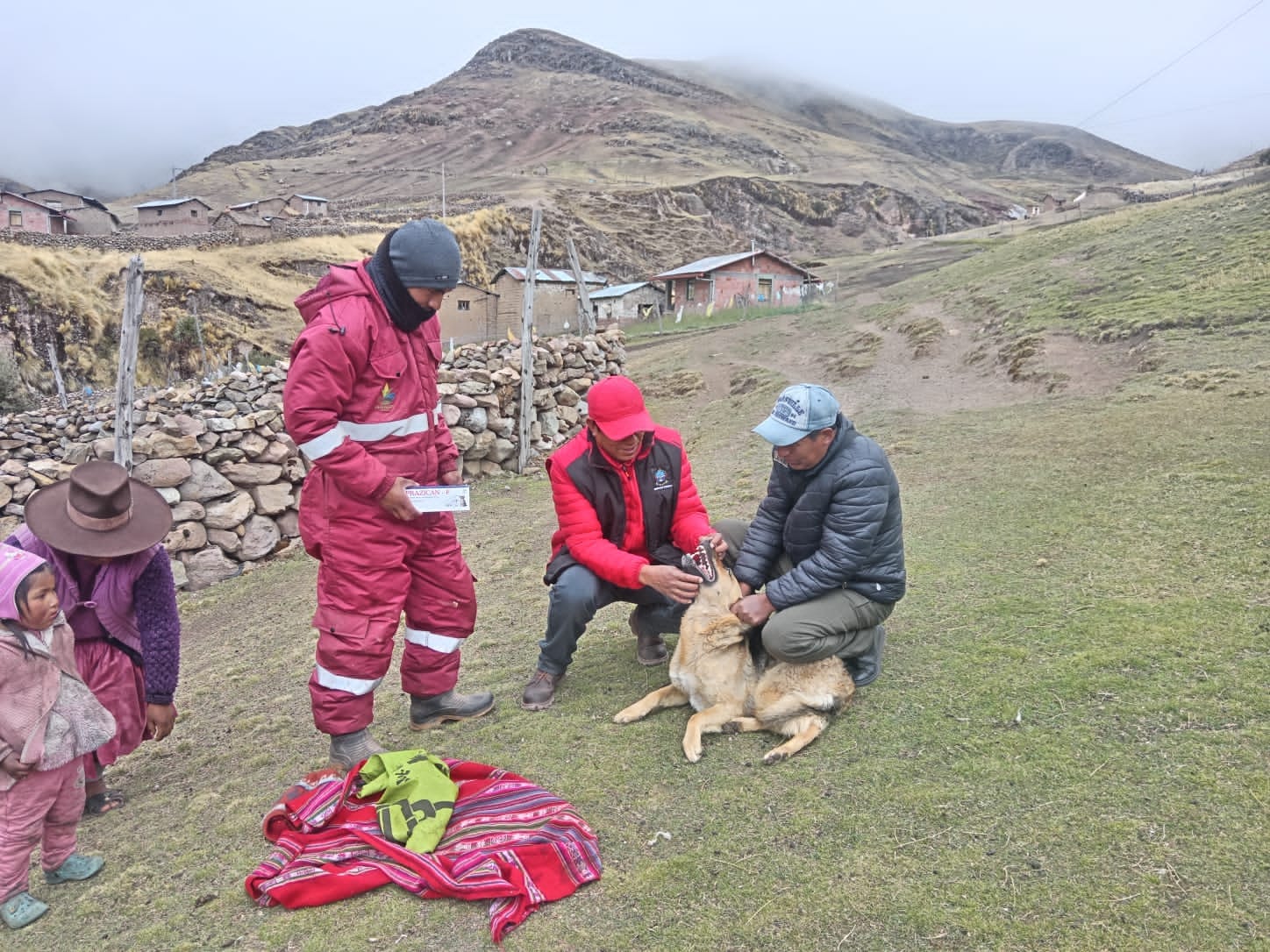Entre gossos i ovelles: la lluita contra l’equinococcosi a la serra del Perú
Entre gossos i ovelles: la lluita contra l’equinococcosi a la serra del Perú
19 de desembre 2024
A les altures de la serra peruana, on l'aire escasseja però la determinació abunda, es lliura una batalla silenciosa contra l’equinococcosi, una de les malalties tropicals desateses que figura a la llista de l’Organització Mundial de la Salut (OMS). Aquesta zoonosi, que afecta prop d’un milió de persones arreu del món, es transmet dels animals als humans i troba en els gossos i les ovelles els seus principals vectors de propagació.
A la ciutat de Combapata, els gossos es mouen per la plaça de forma erràtica, flairant les escombraries o creuant-se en camins silenciosos. Formen part del paisatge urbà, com les cases o els cotxes, i podrien passar desapercebuts si no fos perquè són una de les raons per les quals visitem aquest projecte a la serra del Perú. Tot i que semblen inofensius, són una peça clau en la cadena de transmissió de la malaltia. El paràsit que causa l’equinococcosi s’allotja als intestins dels gossos després de consumir vísceres d’ovelles infectades, i els seus ous es disseminen a través de les femtes, contaminant l’entorn, inclosos aliments i cultius.
Conscients d’aquesta realitat, Probitas treballa amb el seu soci local ABC Prodein en un enfocament integral per combatre la malaltia. L'estratègia combina acció comunitària, educació sanitària i control dels factors de risc. Es promou la millora dels escorxadors locals (camals) per evitar que les vísceres infectades arribin als gossos, mentre que a les escoles es fan tallers amb titelles per ensenyar als infants la importància de desparasitar les seves mascotes i mantenir hàbits d’higiene.
La infància, la millor missatgera
"Els nens i les nenes són els millors missatgers", comenta la germana Martha de Prodein, que a través de les seves titelles narra la història d’un gos, una ovella i una infermera, captant l’atenció dels més petits. Aquí no hi ha cap nen o nena que no jugui amb el seu gos, i això els fa més vulnerables al contagi. Mitjançant les titelles, se’ls explica la importància de desparasitar els seus gossos, rentar-se les mans i convèncer els seus pares que no donin les vísceres de les ovelles als cans. La meta és que els infants portin aquest missatge a les seves llars, aconseguint així un canvi d’hàbits arrelats.
Els esforços no es limiten a les aules. Per als adults, es realitzen sessions de sensibilització amb projecció de vídeos i xerrades formatives. A més, s’ha posat en marxa una campanya de desparasització de gossos liderada per funcionaris locals com l’enginyer Juan Carlos Rodríguez, la iniciativa del qual ha permès tractar centenars de gossos a Combapata i les comunitats properes. La seva acció ha servit d'exemple per a altres municipis que ara busquen replicar l’experiència.

Enfocament multisectorial
L'enfocament multisectorial és fonamental en aquesta lluita. Durant la nostra visita al projecte, mantenim una reunió amb els alcaldes de les poblacions on s'està treballant, amb els investigadors de la Universitat Continental, els tècnics encarregats del control dels escorxadors, els veterinaris i els responsables de la desparasització de les ovelles i els gossos.
La coordinació entre municipis, universitats, equips veterinaris i personal de salut permet no només la desparasització de gossos, sinó també la vigilància activa de la salut humana a través de recerques sobre la prevalença d’aquesta malaltia a les comunitats. En aquest sentit, es realitzen campanyes d’ecografies per detectar quists hidatídics en persones en risc. Al centre de salut de Pomacanchi, situat a 3.700 metres d’altitud, familiars de pacients ja diagnosticats se sotmeten a aquestes proves.
"Vaig sortir amb el cor tranquil", confessa una dona gran, una "mamita", com les anomenen aquí, després de sortir de la sala d’ecografies. Li acaben de confirmar que no té quists. Parla en quítxua amb la seva família i somriu nerviosa i alleujada.
La lluita contra l’equinococcosi, o hidatidosi, com també es coneix aquí, és llarga i complexa, però cada acció que funciona és una batalla guanyada. Des de les titelles de la germana Martha fins a la campanya de desparasització liderada per Rodríguez, cada acció suma per assolir la victòria final.
Anna Veiga, directora de Probitas, comenta: "Encara que la malaltia actua de forma silenciosa, la resposta en aquestes comunitats és forta i determinada. Perquè aquí, a les altures de la serra peruana, s'està demostrant que, amb educació, compromís i col·laboració, fins i tot les malalties més invisibles es poden derrotar".
The fight against echinococcosis — or hydatidosis, as it is also known, due to the hydatid cysts it causes — is long and complex. But each successful activity represents a small victory. From Sister Martha’s puppets to Rodríguez's deworming campaign, every effort contributes to the final triumph.
Anna Veiga, director of Probitas, remarks, "Although the disease acts silently, the response from these communities is strong and determined. Here, in the heights of the Peruvian highlands, it is clear that with education, commitment, and collaboration, even the most invisible diseases can be overcome."

